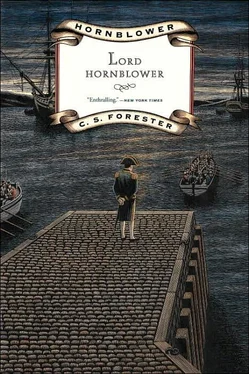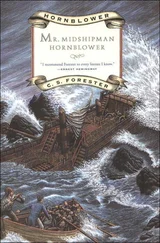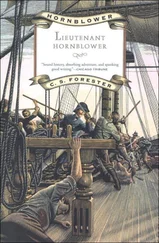Cecil Forester - Lord Hornblower
Здесь есть возможность читать онлайн «Cecil Forester - Lord Hornblower» весь текст электронной книги совершенно бесплатно (целиком полную версию без сокращений). В некоторых случаях можно слушать аудио, скачать через торрент в формате fb2 и присутствует краткое содержание. Год выпуска: 1989, ISBN: 1989, Издательство: Little, Brown & Company, Жанр: Исторические приключения, Путешествия и география, Морские приключения, на английском языке. Описание произведения, (предисловие) а так же отзывы посетителей доступны на портале библиотеки ЛибКат.
- Название:Lord Hornblower
- Автор:
- Издательство:Little, Brown & Company
- Жанр:
- Год:1989
- ISBN:0316289434
- Рейтинг книги:5 / 5. Голосов: 1
-
Избранное:Добавить в избранное
- Отзывы:
-
Ваша оценка:
- 100
- 1
- 2
- 3
- 4
- 5
Lord Hornblower: краткое содержание, описание и аннотация
Предлагаем к чтению аннотацию, описание, краткое содержание или предисловие (зависит от того, что написал сам автор книги «Lord Hornblower»). Если вы не нашли необходимую информацию о книге — напишите в комментариях, мы постараемся отыскать её.
Lord Hornblower — читать онлайн бесплатно полную книгу (весь текст) целиком
Ниже представлен текст книги, разбитый по страницам. Система сохранения места последней прочитанной страницы, позволяет с удобством читать онлайн бесплатно книгу «Lord Hornblower», без необходимости каждый раз заново искать на чём Вы остановились. Поставьте закладку, и сможете в любой момент перейти на страницу, на которой закончили чтение.
Интервал:
Закладка:
“A powder magazine of discontent and disunion,” said the Count. “A spark may explode it.”
Hornblower had dreamed the same dream when he had entered Le Havre, and used the same metaphor to himself, which was unfortunate.
“Bonaparte has an army,” he said. “It takes an army to defeat an army. Where is one to be found? The old soldiers are devoted to Bonaparte. Will the civilians fight, and if so, can they be armed and trained in time?”
“You are in a pessimistic mood, milord,” said the Duchess.
“Bonaparte is the most able, the most active, the fiercest and the most cunning soldier the world has ever seen,” said Hornblower. “To parry his strokes I ask for a shield of steel, not a paper hoop from a circus.”
Hornblower looked round at the faces; the Duchess, the Count, Marie, the silent courtier-general who had stood behind the Duchess since the debate began. They were sombre, but they showed no signs of wavering.
“So you suggest that M. le Comte here, for example, should submit tamely to the usurper and wait until the armies of Europe reconquer France?” asked the Duchess with only faint irony. She could keep her temper better than most Bourbons.
“M. le Comte has to fly for his life on account of his late kindness to me,” said Hornblower, but that was begging the question, he knew.
Any movement against Bonaparte in the interior of France might be better than none, however easily suppressed and whatever blood it cost. It might succeed, although he had no hope of it. But at least it would embarrass Bonaparte in his claim to represent all France, at least it would hamper him in the inevitable clash on the north-eastern frontier by forcing him to keep troops here. Hornblower could not look for victory, but he supposed there was a chance, the faintest chance, of beginning a slight guerrilla war, maintained by a few partisans in forests and mountains, which might spread in the end. He was a servant of King George; if he could encompass the death of even one of Bonaparte’s soldiers, even at the cost of a hundred peasant lives, it was his duty to do so. A momentary doubt flashed through his mind; was it mere humanitarian motives that had been influencing him? Or were his powers of decision becoming enfeebled? He had sent men on forlorn hopes before this; he had taken part in some himself; but this was, in his opinion, an utterly hopeless venture—and the Count would be involved in it.
“But still,” persisted the Duchess, “you recommend supine acquiescence, milord?”
Hornblower felt like a man on a scaffold taking one last look at the sunlit world before being thrust off. The grim inevitabilities of war were all round him.
“No,” he said. “I recommend resistance.”
The sombre faces round him brightened, and he knew now that peace or war had lain in his choice. Had he continued to argue against rebellion, he would have persuaded them against it. The knowledge increased his unhappiness, even though he tried to assure himself—which was the truth—that fate had put him in a position where he could argue no longer. The die was cast, and he hastened to speak again.
“Your Royal Highness,” he said, “accused me of being pessimistic. So I am. This is a desperate adventure, but that does not mean it should not be undertaken. But we must enter upon it in no light-hearted spirit. We must look for no glorious or dramatic successes. It will be inglorious, long, and hard. It will mean shooting French soldiers from behind a tree and then running away. Crawling up in the night to knife a sentry. Burning a bridge, cutting the throats of a few draught horses—those will be our great victories.”
He wanted to say ‘those will be our Marengos and our Jenas’, but he could not mention Bonaparte victories to a Bourbon gathering. He raked back in his memory for Bourbon victories.
“Those will be our Steinkerks and our Fontenoys,” he went on. To describe the technique of guerrilla warfare in a few sentences to people absolutely ignorant of the subject was not easy. “The Lieutenant-General for the King in the Nivernais will be a hunted fugitive. He will sleep among rocks, eat his meat raw lest a fire should betray him. Only by being reconciled to measures of this sort can success be won in the end.”
“I am ready to do those things,” said the Count, “to my last breath.”
The alternative was exile until his death, Hornblower knew.
“I never doubted that I could rely on the loyalty of the Ladons,” said the Duchess. “Your commission will be ready immediately, M. le Comte. You will exercise all royal power in the Nivernais.”
“What does Your Royal Highness intend to do in person?” asked Hornblower.
“I must go on to Bordeaux, to rally Gascony.”
It was probably the best course of action—the wider spread the movement the greater Bonaparte’s embarrassment. Marie could accompany the Duchess, too, and then if the enterprise ended in complete disaster escape would be possible by sea.
“And you, milord?” asked the Duchess.
All eyes were upon him, but for once he was not conscious of it. It was an entirely personal decision that he had to make. He was a distinguished naval officer; let him make his way to England and the command of a squadron of ships of the line was his for certain. The vast fleets would range the seas again, and he would play a major part in directing them; a few years of war would see him an admiral with a whole fleet, the man upon whom the welfare of England would depend. And if he stayed here the best he could hope for was the life of a hunted fugitive at the head of a ragged and starving brigand band; at worst a rope and a tree. Perhaps it was his duty to save himself and his talents for England, but England had able naval officers by the score, while he had the advantage of knowing much about France and the French, and even of being known to them. But all these arguments were beside the point. He would not—could not—start a little feeble squib of a rebellion here and then run away and leave his friends to bear the brunt of failure.
“I will stay with M. le Comte,” he said. “Provided that Your Royal Highness and he approve of such a course. I hope I will be of assistance.”
“Certainly,” said the Duchess.
Hornblower caught Marie’s eye, and a horrid doubt suddenly assailed him.
“Madame,” he said, addressing her, “you will accompany Her Royal Highness, I presume?”
“No,” said Marie. “You will need every man, and I am as useful as a man. I know every ford and bridle-path round here. I stay with M. le Comte too.”
“But Marie—” said the Count.
Hornblower made no protest at all. He knew he might as well protest about the fall of an elm-tree branch or a change in the direction of the wind. He seemed to recognise destiny—the utterly inevitable—in all this. And one glance at Marie’s face silenced the Count’s expostulations.
“Very well,” said the Duchess.
She looked round at them; it was time for the rebellion to begin in earnest. Hornblower put aside his personal feelings. There was a war to be fought; war with all its problems of space and time and psychology. He set himself, almost without willing it, to pick up the tangled threads. Above the desk where the Prefect had sat to execute instructions from the Paris Government was a large scale map of the Department. On the other walls hung even larger scale maps of the sub-prefectures. He looked over at them. Roads, rivers, forests. Goodbye to England.
“The first important thing to know,” he began, “is where the nearest regular troops are stationed.”
The campaign of the Upper Loire was begun.
Chapter XIX
The forest track which they were following met another at right angles. It was frightfully hot even here in the shade of the pines, thunderstorm weather. Hornblower’s feet were badly blistered, and he was hobbling along with difficulty even on the soft pine-needle mould underfoot. There was no wind to call forth any sound from the trees; everything was silent. Even the hoofs of the horses made no sound—the three pack-horses that carried food and ammunition, the two horses carrying wounded men, and the one horse that carried His Excellency the King’s Lieutenant-General for the Nivernais. Twenty men and two women were shuffling along the trail with Hornblower, the main body of His Most Christian Majesty’s army. There was an advance guard of five under Brown out ahead, a rearguard of five far behind.
Читать дальшеИнтервал:
Закладка:
Похожие книги на «Lord Hornblower»
Представляем Вашему вниманию похожие книги на «Lord Hornblower» списком для выбора. Мы отобрали схожую по названию и смыслу литературу в надежде предоставить читателям больше вариантов отыскать новые, интересные, ещё непрочитанные произведения.
Обсуждение, отзывы о книге «Lord Hornblower» и просто собственные мнения читателей. Оставьте ваши комментарии, напишите, что Вы думаете о произведении, его смысле или главных героях. Укажите что конкретно понравилось, а что нет, и почему Вы так считаете.









